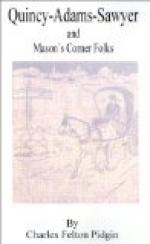Then Quincy recited the words of the song. He had no need to read them, for he knew them by heart. It seemed to him that he had written the words himself. He did not even remember the author’s name, and Alice stood with bowed head and closed eyes and drank in these words as they fell from his lips:
In
this heart of mine the bird of love
Has
built a nest,
Has
built a nest.
And
so she has in mine!
Response:
And
so she has in mine!
And
she toils both day and night, no thought
Of
food or rest
Of
food or rest,
And
sings this song divine.
Response:
And
sings this song divine.
Duet:
All
the day long,
Such
a sweet song,
Teaching
love true,
I
love! Do you?
When Quincy came to the last line, instead of reading it he turned to the piano and sang it with even more passion in his voice than at first.
“Will you try it over with me?” he said. And without waiting for her reply he dashed off the prelude.
Their voices rang out together until they reached the line, “And so she has in mine.” As Alice sang these words she opened her eyes and looked upward. A smile of supreme joy spread over and irradiated her face. Her voice faltered; she stopped, then she caught at the piano with her right hand. She tottered and would have fallen if Quincy had not sprung up and taken her in his arms.
“Is it true, Alice?” cried he; “is it so? Can you truly say, ’And so she has in mine?’”
And Alice looked up at him with that glorious smile still upon her face and softly whispered, “‘And so she has in mine,’ Quincy.”
Quincy led her to the lounge by the window, through which the cool evening breeze was blowing, and they sat down side by side. It has been truly said that the conversations of lovers are more appreciated by themselves than by anybody else, and it is equally true that at the most tender moment, in such conversations, intensely disagreeable interruptions are likely to occur.
Sometimes it is the well-meaning but unthinking father; again it is the solicitous but inquisitive mother; but more often it is the unregenerate and disrespectful young brother or sister. In this case it was Miss Rosa Very, who burst into the room, bright and rosy, after her trip upon the water. As she entered she cried out, “Oh! you don’t know what you missed. I had a most delightful—” She stopped short, the truth flashed upon her that there were other delightful ways of passing the time than in a sailboat. She was in a dilemma.
Quincy solved the problem. He simply said, “Good-by, Alice, for one short week.”
He turned, expecting to see Miss Very, but she had vanished. He clasped Alice in his arms, and kissed her, for the first time, then he led her to her easy-chair and left her there.




